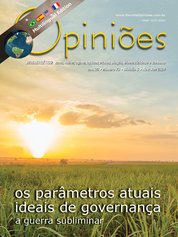Guilherme Nastari
Economista Agrícola da Datagro
OpAA78
Na moda novamente
O agronegócio brasileiro vive um momento muito especial de reconhecimento no País e na comunidade internacional. O modelo de operação de ativos agroindustriais desenvolvido pelo Brasil se tornou um grande exemplo para diversas regiões importantes mundo afora.
A segurança alimentar e a geração de energia renovável são assuntos cada vez mais relevantes, especialmente em um contexto de conflitos geopolíticos, como são os casos no Leste Europeu e em Gaza, que elevam os temores de escassez de alimentos e energia. Nesse cenário, o agronegócio brasileiro se consolida como opção viável, estável e competitiva para o fornecimento de alimento e energia limpa, sempre em consonância com as metas de descarbonização de tratados internacionais, como o Acordo de Paris.
É importante ressaltar que, em meados do século passado, a agricultura brasileira era rudimentar e, até a década de 80, o País era um grande importador de alimentos. Porém, a semente da autossuficiência foi plantada nos anos 70, quando surgiu a Embrapa – Empresa Brasileira de Pesquisa Agropecuária.
De lá para cá, o desenvolvimento da agricultura tropical viabilizou a expansão agroindustrial no Centro-Oeste, com o surgimento de um novo modelo de operação e manejo de fazendas em regiões anteriormente não tão desenvolvidas. O agribusiness brasileiro passa a ser um dos maiores e mais eficientes do mundo.
Muito além de commodities agrícolas, o Brasil também exporta tecnologia e know-how. O modelo de produção brasileiro de energias limpas, como é o do etanol e do biodiesel, se tornou referência em diversas regiões pelo mundo.
A Índia e a Indonésia anunciaram, nos últimos anos, programas importantes de revitalização dos setores de produção de alimentos e energias renováveis baseados na experiência brasileira.
No caso da Índia, especificamente, país que possui a terceira maior frota de carros do mundo e uma população de mais de 1,4 bilhão de pessoas, o etanol se mostra como a alternativa mais viável para a mitigação de GEE – Gases de Efeito Estufa, e também o principal indutor para o início da transição energética localmente. Como importante produtor global de cana-de-açúcar, a Índia almeja aumentar de 10% para 20% a mistura do biocombustível à gasolina, até 2025, em todo o seu território – 15 cidades indianas já adotam o E20.
Para a produção de alimentos, o Brasil lidera as exportações de soja, milho, açúcar, café, carnes bovina e de frango, e suco de laranja. Outras commodities em que somos destaque são a da carne suína, do etanol, do algodão, e das frutas, nas quais o Brasil se posiciona como segundo ou terceiro produtor, ou exportador. Esse protagonismo é ainda mais impressionante e revelador quando levamos em consideração que o agronegócio brasileiro preserva a maior biodiversidade do mundo, com mais de 66% da vegetação nativa do território nacional conservada, de acordo com levantamento da Nasa.
A produção se concentra principalmente na região Centro-Sul do país, longe do bioma amazônico. A área destinada à preservação ambiental nas propriedades rurais equivale a mais de 33% do território nacional, conforme dados da Embrapa.
Os olhares do próprio Brasil sobre a sua principal atividade econômica têm mudado muito nos últimos anos. Cada vez mais, moradores de grandes centros urbanos têm reconhecido a importância do campo para a economia do país.
Em 2023, conforme dados da CNA – Confederação Nacional da Agricultura e Pecuária do Brasil, o PIB – Produto Interno Bruto, do agronegócio brasileiro poderá representar 24,4% do PIB total do País, ou cerca de R$ 2,63 trilhões.
Os desafios são grandes, mas as perspectivas são excelentes. Com o aumento exponencial da produtividade e o desenvolvimento de tecnologias que aceleram o caminho para a transição energética, o agronegócio brasileiro tem todos os pré-requisitos para continuar sendo o mais eficiente e o mais relevante do mundo.




